Matthew Yglesias's Blog, page 2274
June 15, 2011
Heading to Minneapolis
Hey folks, I'm off to Minneapolis for Netroots Nation so content will be coming out at a slightly reduced pace. Here's a Hüsker Dü song in honor of the Twin Cities:
Obviously the highlight of the conference will be my panel on the Federal Reserve, though I hear some people think Senator Franken is funny.


June 14, 2011
The Value Of a Blog Post
Erik Loomis has posted a pretty lengthy response to me on the subject of boycotting the Huffington Post, but reading his argument over, I actually think the disagreement between us is pretty simple. His view seems to be that if everyone boycotts the Huffington Post until they agree to stop using unpaid bloggers that what will happen is that currently unpaid bloggers will get paid. My view is that if everyone boycots the Huffington Post until they agree to stop using unpaid bloggers, what will happen is that currently unpaid bloggers won't be writing for the Huffington Post anymore.
After all, it's not as if the Huffington Post has some kind of across the board policy of refusing to pay writers. They pay Sam Stein. They pay Jason Linkins. They pay for the content that it's worth it for them to pay for. They don't pay their unpaid contributors because the unpaid contributors generate very little traffic, so it wouldn't be worthwhile to pay them. A handful of the very most popular unpaid bloggers — people who are generally already established public figures like Robert Reich or Bob Kuttner — would get a bit of extra money, and the other unpaid bloggers would need to drift off to other outlets. That would reduce overall revenues at Huffington Post and, as discussed previously, depress the earnings of the site's paid staff.
Loomis also says lots of other things that I agree with. America produces too many PhDs. There's a lot of dishonest hype about the information economy. The blogosphere is no longer the kinda sorta open meritocracy that it kinds sorta was in 2004. The disagreement is that I don't think refusing to read the Huffington Post until it stops publishing unpaid bloggers solves any of these problems.


Good News And Bad News In Automobile-Driven Decline In Retail Sales For May
The Census' preliminary numbers for May show a drop in retail sales (PDF) confirming the other bad data:
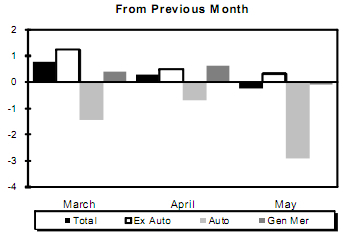
The good news here is that the bad news was all in automobiles. That, in turn, seems to have been driven by supply disruptions in Japan that caused dealers to cancel discounting. So this indicator ought to come bouncing back to a normal level in the next couple of months.


History Teachers Blame NCLB For Low Test Scores Even Though Scores Are Up
The 2002 No Child Left Behind law encourages schools to focus on teaching the core subjects of reading and math, which critics have long alleged would lead to dangerous shortfalls in other subjects. So with new NAEP scores out showing that American children don't know much about history, the critics are claiming vindication:
History advocates contend that students' poor showing on the tests underlines neglect shown the subject by federal and state policy makers, especially since the 2002 No Child Left Behind Act began requiring schools to raise scores in math and reading but in no other subject. The federal accountability law, the advocates say, has given schools and teachers an incentive to spend less time on history and other subjects.
But wait a minute! History test scores are actually up, especially in the demographic sub-segments most impacted by NCLB and especially among the younger cohorts of students most impacted by NCLB testing mandates:
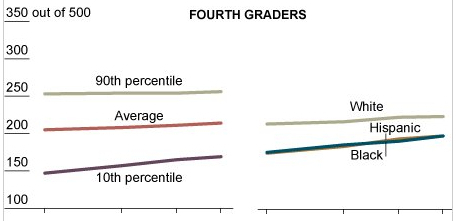
While changes in the overall averages were microscopic, there was significant upward movement among the lowest-performing students — those in the 10th percentile — in fourth and eighth grades and a narrowing of the racial achievement gap at all levels. On average, for instance, white eighth-grade students scored 274 on the latest test, 21 points higher than Hispanic students and 23 points above black students; in 2006, white students outperformed Hispanic students by 23 points and black students by 29 points.
As it happens, I agree with history advocates that we're seeing the impact of the accountability law. What we're seeing, in particular, is that trying to teach history to kids who can't read is a fool's errand. Focusing more clearly on making sure that kids aren't falling behind in their core skills is helping the worst-off kids do better across the board even at history.


Strong Demand For Transit-Oriented Office Space In New Jersey

Dana Rubinstein reports that rail access is an important driver of real estate trends in America's most densely populated state:
The average vacancy rate in so-called transit hubs in New Jersey was 14.7% in the first quarter of this year, compared with 29.7% in areas not considered transit hubs, according to real-estate brokerage Jones Lang LaSalle. The report defines transit hubs as the 40 million square feet comprising office space in Newark, Elizabeth, Jersey City, Hoboken, Paterson, East Orange, New Brunswick, Trenton and Camden, Morristown and Metropark, all cities with rail service.
At the same time, asking rents in transit hubs were higher, averaging $27.43 compared with the rest of the suburban market's $23.51, according to the Jones Lang LaSalle report. Since 2009, more than 20% of all leasing has occurred in the transit hubs, compared with 15 percent before 2009.
Good for New Jersey. It's a reminder both that investments in rail can pay off, but also that it's painful to see restrictions placed on dense building near stations. In Trenton's relatively small downtown zoning district, for example, no building may be more than 210 feet tall. That's more than we allow here in DC, and amidst a serious recession, it's probably not having a discernable impact, but over the long run there's a cost here. Some day the demand for office construction will come back in New Jersey. If us urbanist types are right, that demand will particularly express itself in terms of demand for transit-adjacent structures. But will that mean lots of new transit-oriented development, or will it just mean that Trenton real estate becomes expensive as we keep adding suburban office parks? Letting tall buildings go up near train stations is crucial to making it the former rather than the latter.


China Chart Of The Day
The Economist illustrates what countercyclical macroeconomic policy looks like in China, where they really believe in getting the job done:
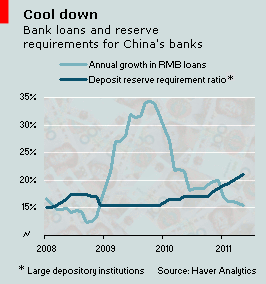
China should probably be doing even more to curb inflation right now, including allowing for a more rapid nominal appreciation of the Yuan. And it's also probably true that a lot of that lending will have gone to boondoggles of various kinds and that there'll be a slowdown soon that makes various large pieces of this countercyclical drive look mistaken. But for all that, at the end of the day having people doing jobs and building things — even wasteful things — is profoundly less wasteful than having them sit around demoralized, humiliated, and unemployed.


Newt Gingrich Falsely Claims That Union-Busting Is The Cure For High Unemployment

By Matthew Cameron
One of the questions at last night's Republican presidential debate came from a New Hampshire reporter who noted that the state is considering enacting so-called "right-to-work" legislation. Since this subject has gained prominence among Republicans in recent weeks, several candidates leapt at the opportunity to reaffirm their support for anti-union labor policies. Here's Newt Gingrich explaining his position:
I hope that New Hampshire does adopt right-to-work. I frankly keep it at the state level because as each new state becomes right to work, they send a signal to the remaining states, don't be stupid.
Why you want to be at California's unemployment level when you can be Texas's employment level? Or North Dakota's?
And I think…that if you believe in the 10th Amendment, we ought to let the states learn from each other. And the right-to-work states are creating a lot more jobs today than the heavily unionized states.
Indeed, why would anyone want to live in pro-union California with its 11.9 percent unemployment when they could enjoy the right-to-work paradises of Texas (8 percent unemployment) or North Dakota (3.3 percent)?
The answer, of course, is that things are a bit more complicated than Gingrich and other Republicans make them out to be. Leaving aside that there are factors other than labor policies that have had much more of an impact on Texas's employment growth, the claim that right-to-work states are better off economically isn't even accurate. In fact, a side-by-side comparison shows that 10 of the 22 right-to-work states had unemployment rates above the national average in April. Of the other 28 states and the District of Columbia, only nine had unemployment rates that exceeded the national average.
Moreover, eight of the 17 states with statistically significant employment growth from March to April were states without right-to-work to laws. The total number of jobs added in those states was 131,700 compared to only 108,400 jobs added in the nine right-to-work states with statistically significant job growth during that time.


Paid And Unpaid Labor As Complements At The Huffington Post
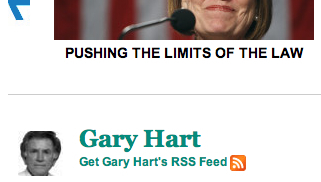
Erik Loomis castigates "the progressive blogosphere and young progressives in general" for a "lack of concern over labor" as evidenced by, for example, our lack of interest in the union-sponsored boycott of the Huffington Post over its use of a mix of paid and unpaid labor. So I'll pay heed to the issue, though I won't be boycotting anything. I'll just start with the observation that there's something ironic about a college professor writing a blog post for which he presumably wasn't paid in order to castigate the practice of unpaid blogging.
Those of us who write or a living on the internet might well benefit from a rule banning amateur content creation online. No more professors giving opinions on political issues away for free! No more videos of cute cats on YouTube! Heck, no more Wikipedia! More traffic for me! What's not to like? Obviously there are free speech problems with trying to legally ban amateur internet writing. But should we boycott all free internet writing? My view is that we shouldn't, even if Wikipedia is reducing the demand for unionized teamsters to deliver physical encyclopedias.
But if we're not going to object to free Internet writing in general, then what's the problem with mixing free and paid writing on the same site? It seems to be the case that in the Huffington Post's model, these things are complements. When Gary Hart has something he wants to say, he gains access to a large web audience by posting his thoughts on the Huffington Post rather than launching a Gary Hart Tumblr. But when you read Gary Hart's item, you're subjected to all the HuffPo navigational tools urging you to click onto other HuffPo stories. The item not only generates a modest amount of traffic on its own, it creates some "spillover" traffic to other Huffington Post items. The spillover traffic increases the value of the Huffington Post's paid reporters and editors, and even the non-spillover traffic increases the value of the Huffington Post's technical and business staffs.
The idea is perhaps that it's wrong for some people (AOL shareholders) to be profiting from the unpaid work of Gary Hart. But there's no way for Gary Hart to express his views on the Internet without someone profiting from it. All the blogging platforms are for-profit firms that want people to use them. And that's to say nothing of the telecom firms and search engines who are all glad that the Web is full of all this free content that people want to read. Ultimately nothing is ever DIY enough to entire separate itself from the entire chain of capitalist production.


Don't Look To Insiders To Drive Job Growth
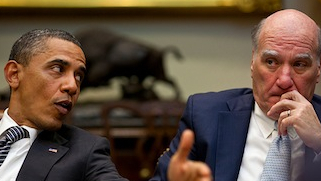
Jia Lynn Yang's Washington Post article "Good for Obama's jobs council, good for America?" has a great headline and theme, but it actually winds up taking a slightly odd direction. Her main point is that "decades of globalization have loosened the connection between the health of large U.S. firms and the economy" since you can both produce things abroad and sell them to foreigners.
That's all true enough, but the problem is much more general. Job growth doesn't generally come from the firms that are already big. It comes from the firms you haven't heard of getting big. By the time a company gets big enough that its CEO can score meetings with the president of the United States, its fastest-growing days are likely to be in the past. Now my sense is that this whole council is a PR stunt that has no real relationship to policy, but even as PR, I think it sends a bad message about the relationship between business, government, and growth. If you're already a successful company, what you primarily want out of public policy is protection from disruptive change, but that's no way to create sustainable growth.


David Brooks Urges Barack Obama To Endorse Barack Obama's Agenda
I don't want to go on about this at too much length, but David Brooks' pox on both houses "Hamiltonian" lament ends with a set of positive policy proposals that seems to be entirely composed of things Barack Obama has proposed. Ezra Klein spells it out in more detail.
I'll just add that even more so than what I said about budget options, this is a situation in which complaints are properly addressed to the nature of American political institutions. Barack Obama's ambitious reform agenda winds up looking, in practice, a lot like squalid transactional interest group brokerage because the American system is biased against ambitious reform agendas and in favor of squalid transactional interest group brokerage. I agree with Brooks that this is a serious problem, but the irony is that falling for the conceit that you can overcome it by putting someone else in the pilot seat is one of Obama's worst attributes. Now he's being bitten by it.


Matthew Yglesias's Blog
- Matthew Yglesias's profile
- 72 followers



